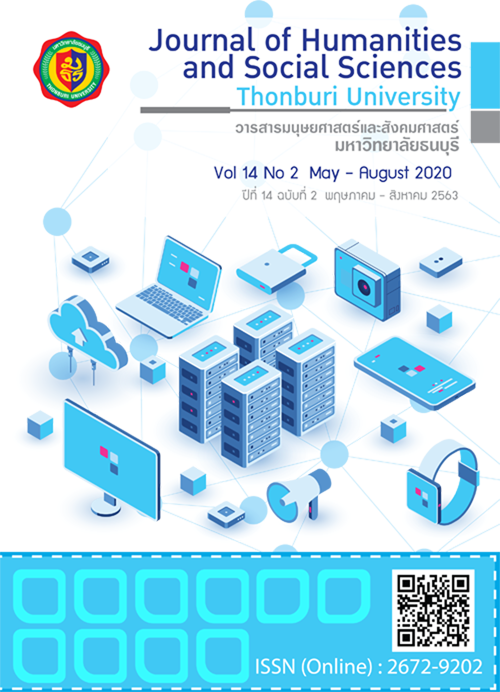กรอบแนวคิดการพัฒนาศักยภาพทรัพยากรมนุษย์ด้านนวัตกรรมขององค์การธุรกิจไทยในยุคดิจิตอล
คำสำคัญ:
กรอบแนวคิด, การพัฒนาทรัพยากรมนุษย์, ศักยภาพด้านนวัตกรรม, องค์การธุรกิจไทย, ยุคดิจิตอลบทคัดย่อ
บทความนี้มีวัตถุประสงค์เพื่อสังเคราะห์กรอบแนวคิดของการพัฒนาศักยภาพทรัพยากรมนุษย์ด้านนวัตกรรมขององค์การธุรกิจไทยในยุคดิจิตอล โดยใช้การสังเคราะห์ทฤษฎีและงานวิจัยที่เกี่ยวข้อง นำมาพัฒนาเป็นกรอบแนวคิดที่ประกอบด้วยปัจจัยต่าง ๆ คือ การสนับสนุนโดยองค์การ การสนับสนุนโดยตนเอง การซึมซับความรู้ ซึ่งนำไปสู่การพัฒนาศักยภาพด้านนวัตกรรมของบุคลากร ยิ่งไปกว่านั้นบทความนี้ได้แสดงเห็นว่าการที่องค์การธุรกิจจะสามารถพัฒนาศักยภาพด้านนวัตกรรมของพนักงานให้ประสบความสำเร็จได้นั้น องค์การธุรกิจต้องคำนึงถึง 3 ปัจจัยหลัก ได้แก่ การสนับสนุนจากองค์การ การสนับสนุนจากพนักงานเอง และ การซึมซับความรู้ของพนักงาน
เอกสารอ้างอิง
สำนักคณะกรรมการนโยบายวิทยาศาสตร์ เทคโนโลยีและนวัตกรรมแห่งชาติ. (2560). รายงานผลการสำรวจการวิจัยและพัฒนาและกิจกรรมนวัตกรรมในภาคอุตสาหกรรมของประเทศไทย, ศูนย์ขอมูลวิทยาศาสตร์ เทคโนโลยีและนวัตกรรม.
สำนักงานนวัตกรรมแห่งชาติ. (2557). รายงานผลการสำรวจขีดความสามารถด้านนวัตกรรมของประเทศไทย. กระทรวงวิทยาศาสตร์และเทคโนโลยี.
Adam, O. B. (2014). Lexical access, knowledge transfer and meaningful learning of scientific terminology via an etymological approach. International Journal of Biology Education, 3(2), 1-12.
Avlonitis, G. J., Kouremenos, A., & Tzokas, N. (1994). Assessing the innovativeness of organizations and its antecedents: Project Innovstrat. European Journal of Marketing, 28(1), 5-28.
Beaume, R., & Midler, C. (2009). From technology competition to reinventing individual ecomobility: New design strategies for electric vehicles. International Journal of Automotive Technology and Management. 9(2): 174–190.
Borkovich, D. J., & R. Morris. (2012). When corporations collide: Information overload. Issues in Information Systems. 13(2): 269–284.
Chesbrough, H. W. (2003). Open Innovation: The New Imperative for Creating and Profiting from Technology. Boston, Massachusetts: Harvard Business School Press.
Gregory, J. B., & Levy, P. E. (2010). Employee coaching relationships: enhancing construct clarity and measurement, Coaching: An International Journal of Theory, Research and Practice. 3(2): 109-123.
Haarhoff, B., Gibson, K., & Flett, R. (2011). Improving the quality of cognitive behaviour therapy case conceptualization: The role of self-practice/ self-reflection. Behavioural and Cognitive Psychotherapy. 39(3): 323–339.
Lane, P. J., Koka, B. R., & Pathak, S. (2006). The Reification of Absorptive Capacity: A Critical Review and Rejuvenation of the Construct. Academy of Management Review. 31(4): 833-863.
Landy, F. J., & Conte, J. M. (2007). Work in the 21st century: An introduction to industrial and organizational psychology. NY: McGraw-Hill.
McAdam, R. (2014). Determinants for innovation implementation at SME and inter SME levels within peripheral regions. International Journal of Entrepreneurial Behaviour & Research. 20(1): 66-90.
Martelo, S., & Cegarra, J. G. (2014). Linking knowledge corridors to customer value through knowledge processes. Journal of Knowledge Management. 18(2): 342–365.
Messa, S., & Testa, S. (2004). Innovation or Imitation? Benchmarking: A Knowledge Management Process to Innovate Services. Benchmarking: An International Journal. 11(6): 610-620.
Minbaeva, D., Pedersen, T., Bjorkman, I., Fey, C., & Park, H. J. (2003). MNC Knowledge transfer, subsidiary absorptive capacity, and HRM. Journal of International Business Studies. 34(6): 586-599.
Phalaunnaphat, S. (2015). Developing Students Learning Ability by Dint of Self-Directed Learning. Procedia Social and Behavioral Sciences. 197(25): 2074–2079.
Poramet, E., Napaporn, K., & Rapeepun, P. (2019). A study of factors that affect the self-practice of employees for the development of innovation capability of the Thai automotive industry. International Journal of Advanced and Applied Sciences. 6(8): 111-118.
Sandberg, B., & Aarikka-Stenroos, L. (2014). What makes it so difficult? A systematic review on barriers to radical innovation. Industrial Marketing Management. 43(8): 1293-1305.
Sallis, E., & Jones, G. (2002). Knowledge management in education: Enhancing learning & education. London, UK: Kogan Published.
Shabir, A. G., & Mudasir, K. (2015). Diversity of Information Sources in the Digital Age: An Overview. Journal of Advancements in Library Sciences. 2(2): 2349-4352.
Shu-hsien, Liao, Wu-Chen, Fei., & Chih-Chiang, Chen. (2006). Knowledge-intensive industries knowledge sharing, absorptive capacity, and innovation capability: an empirical study of Taiwan's. Journal of Information Science. 33(3): 340–359.
Todd, M., & Douglas, B. (2012). Self-directed learning: A cognitive and computational perspective. Perspectives on Psychological Science. 7(5): 464-481.
Vansteenkiste, M., Simons, J., Lens, W., Sheldon, K. M., & Deci, E. L. (2004). Motivating learning, performance, and persistence: The synergistic effects of intrinsic goal contents and autonomy-supportive contexts. Journal of Personality and Social Psychology. 87(2): 246-260.
Zahra, S., & George, G. (2002). Absorptive Capacity: a review, reconceptualization, and extension. Academy of Management Review. 27(2): 185-203.
Zhou, J., & George, J. M. (2001). When job dissatisfaction leads to creativity: Encouraging the expression of voice. Academy of Management Journal. 44: 682-696.
Zirpoli, F., & Becker, M. (2011). The limits of design and engineering outsourcing: Performance integration and the unfulfilled promises of modularity, R&D Management. 41(1): 21–43.
Translated Thai References
Bureau of Science Policy Committee National Technology and Innovation. (2560). Report of the research and development survey and innovation activities in the industrial sector of Thailand, Science Information Center Technology and innovation. (in Thai)
National Innovation Agency. (2014). Thailand Innovation Capability Survey Report. Ministry of Science and Technology. (in Thai)







